Chemical Attack In Syria Was Jihadists' Provocation, Say Former European Hostages
By Countercurrents.org
13 September, 2013
Countercurrents.org
Serious allegations regarding chemical attacks in Syria are surfacing that include the attack was a provocation made by jihadists and images of chemical attack victims were fabricated. Belgium 's RTL radio station and Italy 's La Stampa carried interviews of a Belgian teacher and an Italian journalist – the hostages – that present these facts.
Citing European hostages in the hands of the jihadists a RT report headlined “Chemical attack was Syria rebel provocation, former hostages say” [1] said:
Two Europeans who were abducted and held hostage for several months in Syria claim they overheard an exchange between their captors which proves that rebels were behind the recent chemical attack.
In a number of interviews to European news outlets, the former hostages - Belgian teacher Pierre Piccinin and Italian journalist Domenico Quiric - said they overheard an English-language Skype conversation between their captors and other men which suggested it was rebel forces, not the government, that used chemical weapons on Syria 's civilian population in an August 21 attack near Damascus .
“It is a moral duty to say this. The government of Bashar al-Assad did not use sarin gas or other types of gas in the outskirts of Damascus ,” Piccinin said during an interview with Belgium 's RTL radio station.
Piccinin stressed that while being held captive, he and fellow prisoner Quirico were secluded from the outside world and had no idea that chemical weapons were deployed. But the conversation which both men overheard suggested that the use of the weapons was a strategic move by the opposition, aimed at getting the West to intervene.
"In this conversation, they said that the gas attack on two neighborhoods of Damascus was launched by the rebels as a provocation to lead the West to intervene militarily,” Quirico told Italy 's La Stampa. "We were unaware of everything that was going on during our detention in Syria , and therefore also with the gas attack in Damascus ."
While stating that the rebels most likely exaggerated the accident's death toll, the Italian journalist stressed that he could not vouch whether “the conversation was based on real facts." However, he said that one of the three people in the alleged conversation identified himself as a Free Syrian Army general, La Stampa reported.
Based on what both men have learned, Peccinin told RTL that it would be “insane and suicidal for the West to support these people.”
“It pains me to say it because I've been a fierce supporter of the Free Syrian Army in its rightful fight for democracy since 2012," Piccinin added.
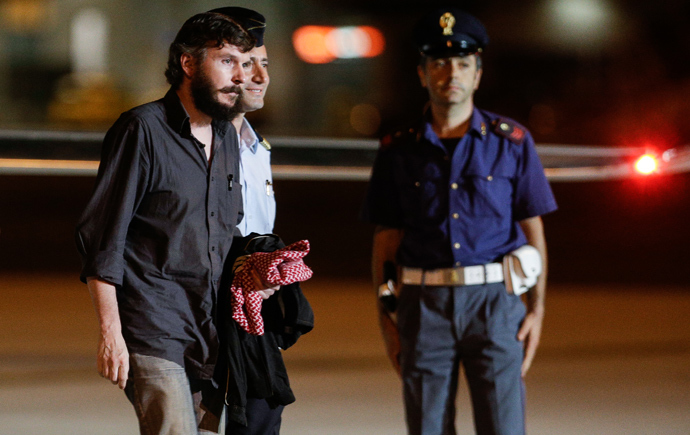
Quirico seems to agree with Peccini's assessment.
“I am extremely surprised that the United States could think about intervening, knowing very well how the Syrian revolution has become international jihadism – in other words Al-Qaeda," Quirico said, as quoted by Italy 's Quotidiano Nazionale.
The 62-year-old La Stampa journalist believes that radical Islamic groups operating in Syria to topple Assad “want to create a caliphate and extend it to the entire Middle East and North Africa .”
In a number of news appearances, both Quirico and Piccinin shared stories of how they were subjected to two mock executions, beaten, and starved during their five-month captivity.
"These have been very tough months. We were beaten on a daily basis, we suffered two mock executions," Quirico told reporters upon his arrival in Rome , AFP reported.
Both men were kidnapped in Syria last April by a group of armed men in pickup trucks who were believed to be from Free Syrian Army.
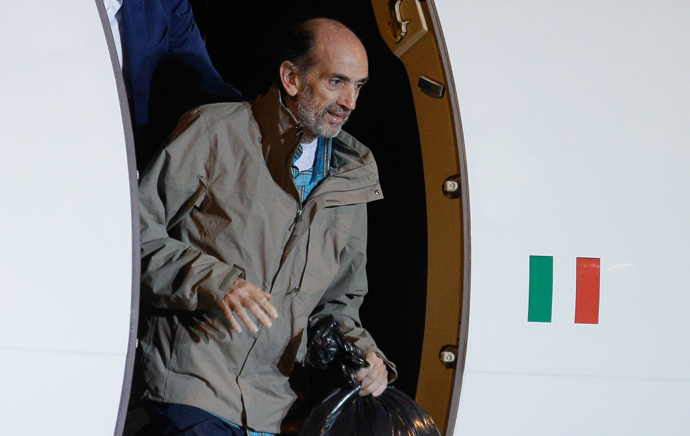
"There was sometimes real violence...humiliation, bullying, mock executions...Domenico faced two mock executions, with a revolver," Piccinin told RTL.
According to Piccinin, the captors soon transferred them over to the Abu Ammar brigade, a rebel group "more bandit than Islamist."
"We were moved around a lot...it was not always the same group that held us, there were very violent groups, very anti-West and some anti-Christian," Piccinin said.
Both men tried to escape twice but their attempts were unsuccessful, prompting the rebel group to punish them for their actions.
The Italian government announced on Sunday that both men had been freed after Rome intensified negotiations with the rebels for the release of the prisoners ahead of an anticipated US strike on Syria .
Another 13 journalists are still believed to be missing in Syria , according to Reporters Without Borders.
Fabricated images
Citing experts in a UN human rights conference in Geneva a RT report headlined “Intl experts have strong proof images of chemical victims fabricated – Moscow ” [2] said:
Footage and photos of the alleged chemical attack in Syria , which the US cites as the reason for a planned military intervention, had been fabricated in advance, speakers told a UN human rights conference in Geneva .
Members of the conference were presented accounts of international experts, Syrian public figures and Russian news reporters covering the Syrian conflict, which back Russia 's opposition to the US plans, the Russian Foreign Ministry said in a statement.
The speakers argued that the suspected sarin gas attack near Damascus on August 21 was likely a provocation of the rebel forces and that a military action against the Syrian president Bashar Assad government will likely result in civilian casualties and a humanitarian catastrophe affecting the entire region.
The possible attack by US military without a UN Security Council mandate would violate international law and should be prevented by the United Nations, some of the speakers said.
Evidence for the Russian case, including numerous eyewitness reports and results of investigations of the chemical weapon incident by activists, was handed over to a UN commission of experts probing the Syrian crisis, the ministry said.
Russia is convinced that the chemical incident was a provocation by rebel forces, which staged a false flag attack to drag the US into the conflict and capitalize on the damage that the Syrian army is likely to sustain in the American intervention.
An increasing number of reports is backing Russia's position, with local witnesses, US and British former intelligence professionals and Europeans recently released from rebel captivity all speaking for a provocation scenario.
Al-Qaeda recruited fighters
Another RT interview headlined “Recruited by Al-Qaeda: Foreign fighters in a Damascus jail tell their stories” [3] said:
Raouchan Gazakov brought his family to Syria , taught his 5-year-old son to make bombs and bade farewell to his relative, a suicide bomber.
RT's Maria Finoshina talked to him in a Damascus prison and asked him why he came to fight for Al-Qaeda.
“A group called Murad approached me a year ago and convinced me that Muslims in Syria are being oppressed and killed, and that I should go and take up arms against Assad for world jihad,” Raouchan said in the spartan prison, where some 200 inmates are held – most of them jihadist fighters for Al-Qaeda or affiliated groups. The prisoners' fate is unknown, although it looks grim.
Raouchan says he sneaked into Syria last January through Turkey . In Istanbul , two men claiming to be from Al-Qaeda met Raouchan and accompanied him to Syria . There, he joined a large terrorist group run by an Egyptian jihadist.
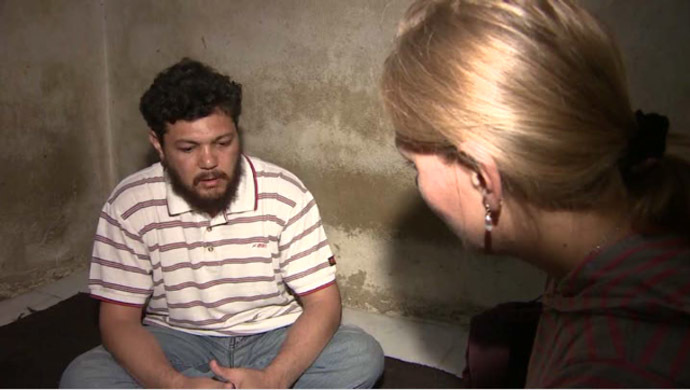
“My job was mainly to prepare bombs for cars. There were many people, all from different countries. Our ‘teachers' showed us how to make bombs – which ingredients to use, and how exactly to make them,” he says.
Raouchan came with his entire family to Syria . In a macabre home movie later found on his laptop, he, his son and a group of men say goodbye to their male relative, who is about to go and blow up a police station in a suicide bomb attack.
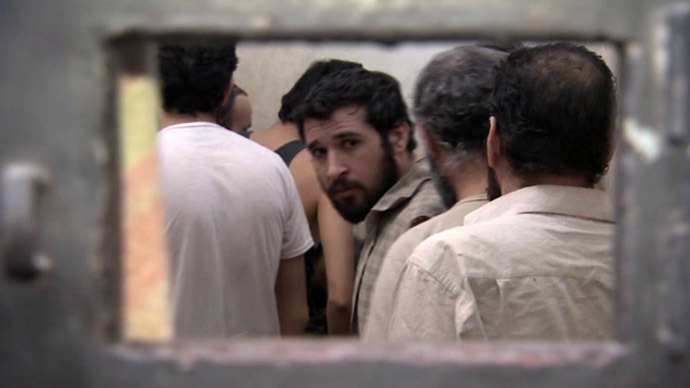
In another video, Raouchan shows his son how to make a bomb.
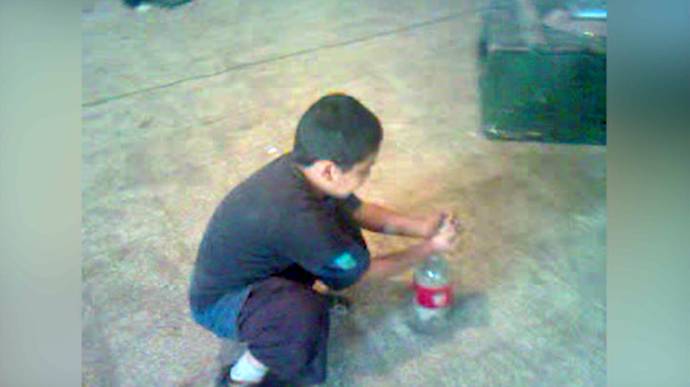
In the Damascus prison, there are many stories of men recruited from faraway lands to come fight for jihad in Syria .
Another detainee, Amer El Khadoud, tells Maria Finoshina how he left a normal life in France , where he lived for years with his wife, a French woman, to join the Syrian jihad with an Al-Qaeda affiliated group.
“I volunteered,” says Amer. “I went to Turkey . In a refugee camp, there I met a Salafi group and I trained with them for about 2 1/2 months, and then we illegally crossed the border into Syria .”
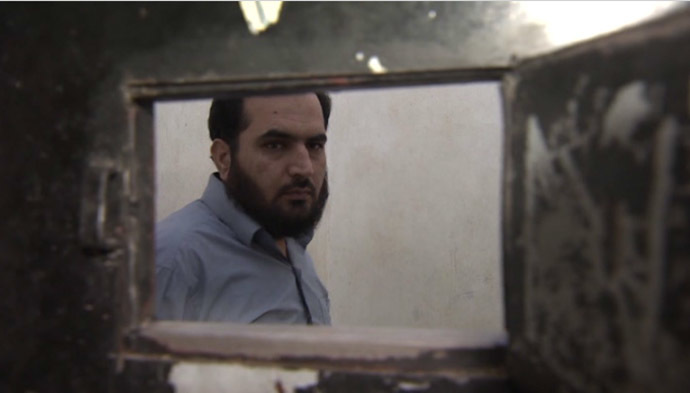
However, upon his arrival, Amer says he was disappointed that the jihad was not as he was promised.
“I saw my Sunni Syrian brothers suffering here. I saw on Al-Jazeera, Al-Arabiya and other channels that kids are also suffering. I took up arms, and I was ready to use them. But when I came here – I didn't see the enemy.”
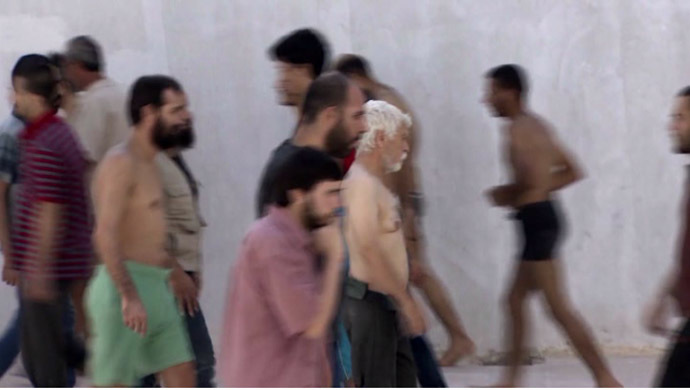
The prisoners' stories of Al-Qaeda recruitment came as a new report, published by the Washington think tank Bipartisan Policy Center, entitled “Jihadist Terrorism: A Threat Assessment,” concluded that "the civil war in Syria may provide Al-Qaeda with an opportunity to regroup, train and plan operations.”
The presence of so many foreign jihadist fighters in the Damascus prison appears to support the center's findings.
“Foreign fighters hardened in that conflict could eventually destabilize the region or band together to plot attacks against the West," the report said.
Reports have been growing for some time of jihadists recruited internationally to fight against Assad's government.
For instance, in January, a leaked memo provided an inside look at how Saudi officials commuted the sentences of 1,200 death row inmates on the condition they join the rebels and fight against Assad in Syria, the Assyrian International News Agency reported.
Source:
[1] September 10, 2013 , http://rt.com/news/chemical-weapons-rebels-captives-632/
[2] September 10, 2013 , http://rt.com/news/experts-un-syria-chemical-649/
[3] September 11, 2013 , http://rt.com/news/syria-foreign-fighters-mercenaries-706/
Comments are moderated
